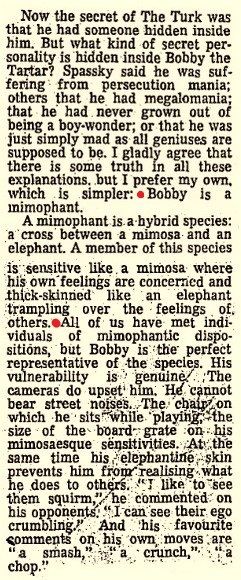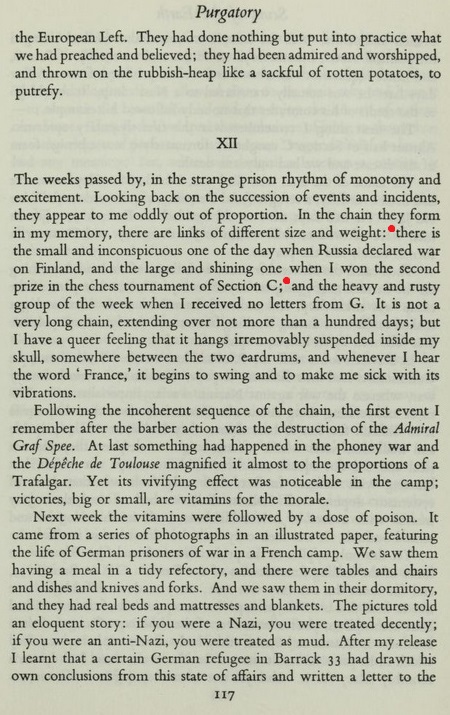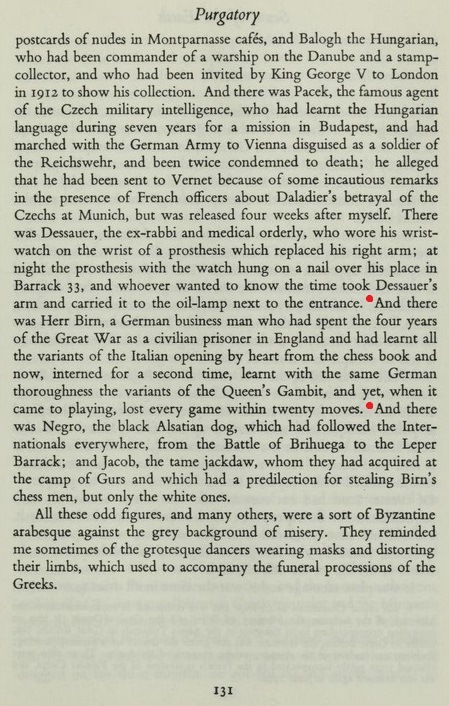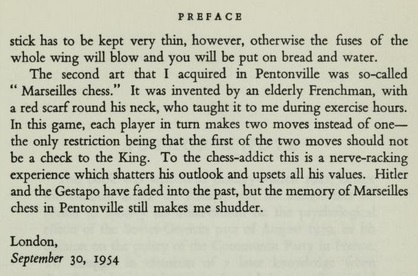
Edward Winter
The London Observer of 3 July 1988 (pages 33-34) has an article by Julian Barnes entitled ‘Playing Chess with Arthur Koestler’. In 1982, the year before Koestler’s suicide, the two writers played an informal five-game match. A.K. won 3-2.
(1725)
See too Playing Chess with Arthur Koestler.
An ‘intellectual’ writer who put no scholarship into his chess writing was Arthur Koestler. Pages 206-231 of his book The Heel of Achilles (New York, 1974) reproduced his (London) Sunday Times articles of 2 July 1972 and 3 September 1972. Below is a sample from pages 213-214 of the book:
‘The great Alekhine, when beaten, often threw his king across the room, and after one important lost game smashed up the furniture in his hotel suite. Steinitz, on a similar occasion, vanished from his quarters and was found disconsolately sitting on a bench in a deserted park. He died insane. So did Morphy, who preceded him as world champion. Morphy suffered from persecution mania; Steinitz from delusions; he thought he could speak over the telephone without using the instrument and that he could move chessmen by electricity discharged from the tips of his fingers. What sane person could devise a symbol more apt for the omnipotence of the mind?’
(3266)
An Arthur Koestler novel set in Palestine, Thieves in the Night (New York, 1946), contains a number of references to chess, two of which are quoted below. Firstly, from page 92:
‘So the argument on Russia took its usual course, rather like a game of chess where at the opening stages both partners know the other’s answer in advance, and once it gets really going throw the chessmen at each other’s head. This time the throwing was started by Moshe our Treasurer. We had already got through the opening, to wit:
White (Queen’s pawn 4): Obvious untruth of the accusations against the Trotskyite opposition.
Black (Queen’s pawn 4): All opposition in a Workers’ State is a priori counter-revolutionary.
White (Queen’s Bishop pawn 4): Growing inequality of pay and privileges for the Bureaucracy.
Black (King’s Bishop pawn 3): Necessity to stimulate production by temporary expedients.
White (King’s Knight Bp. 3): Chauvinistic education, boosting of leadership, religious revival, etc.
Black (Queen’s Knight Bp. 3): Necessity of preparing backward masses for imperialist war and fascist aggression.
White (Dasha, pawn takes pawn): “They even encourage bourgeois decadence, like lipstick, rouge and powder.”
Black (Sarah, retakes pawn, blushes with rage): “The dialectics of proletarian sex-appeal as opposed to the prostitution of bourgeois matrimony ...”
It was at this stage that Moshe lost patience and upset the game.’
The second passage, from pages 134-135, is a curiosity, given that the book was published four years before Julio Kaplan was born:
‘... Mr Newton had looked as usual hopelessly pacific and absent-minded. He was walking with Kaplan, to whom he had just remarked:
“I’ve now played through all the games but three of the New York tournament, and I am more and more inclined to believe that the Indian opening is just a mode which won’t last.”
“No”, said Kaplan with his usual grimness of tone. “It is not just a mode, it is a new step in the evolution of the game. It’s manoeuvring under cover for position, which replaces the cavalry style of the old-fashioned King’s pawn openings, just as in soccer the strategy of the low pass replaced the old kick-and-run technique. In both cases it is planned, co-ordinated, collective action succeeding to individual bravado. The style of all games is influenced by changes in the pattern of social life.”’
(3509)
From page 208 of The Heel of Achilles by Arthur Koestler (New York, 1974):
‘... in his world championship match against the title-holder, Steinitz, Lasker asked to be seated at a separate table because old Steinitz sipped his lemonade with a loud noise (the umpire refused the request).’
Did such an incident occur? In C.N. 3266 we described Koestler as ‘an “intellectual” writer who put no scholarship into his chess writing’, and he was certainly prone to error. On the same page as the Steinitz/Lasker story, Damiano was described as ‘a Frenchman’.
(3580)
Addition on 1 November 2023:
Jerry Spinrad (Nashville, TN, USA) provides the chess column on page 3 of the New-York Tribune, 16 May 1894:

The reference to Steinitz having a birthday celebration on 15 May is noteworthy.
From the first paragraph of Arthur Koestler’s introduction (page 7) to Fischer v Spassky by H. Golombek (London, 1973):
‘In the prehistoric days before the great match started and this book was written, I wrote in the Sunday Times: “Chess is a game too noble to be left to the chess-players”.’
The article in question appeared on pages 33-34 of the 2 July 1972 issue of the newspaper and was reproduced on pages 206-214 of Koestler’s anthology The Heel of Achilles (New York, 1974). The sentiments were, however, expressed tentatively:
‘The haggling about the venue and the revenue, the political invectives and insinuations, made one almost feel that chess is a game too noble to be left to the chess-players.’
(6511)
A further article by Koestler (on pages 33-34 of the Sunday Times, 3 September 1972) is notable for describing Fischer as a ‘mimophant’:

Contrary to occasional claims, Koestler had coined the term many years before he applied it to Fischer. See this Stack Exchange page, which records that on page 7 of his book Suicide of a Nation? (London, 1963) Koestler wrote:
‘My own favourite brain-child is the mimophant.’
Yet Bobby Fischer Goes to War by D. Edmonds and J. Eidinow stated (page numbers vary):
‘The novelist Arthur Koestler, in Reykjavik to cover the match against Spassky, famously coined the neologism “mimophant” to describe Fischer.’
In a text posted online (thearticle.com) on 16 May 2020 Raymond Keene wrote:
‘Koestler it was who, having eventually reached the safe haven offered by the United Kingdom, went on to coin the term “Mimophant” to describe the mercurial Bobby Fischer.’
The words were repeated on page 108 of his book Fifty Shades of Ray and again at thearticle.com on 8 June 2025.
Mike Salter (Sydney, Australia) notes references to chess in Arthur Koestler’s Scum of the Earth (London, 1941):


Our correspondent adds, from page 11 of the 1955 edition, a further passage (also to be found on the Kingpin website):

(10803)
See too Chess Variants and Rule Changes.
Martin Weissenberg (Savyon, Israel) draws attention to the obituary of Koestler by David Pryce-Jones, entitled ‘Chess Man’, on pages 25-28 of Encounter, July-August 1983.
(11796)
To the Chess Notes main page.
To the Archives for other feature articles.
Copyright: Edward Winter. All rights reserved.